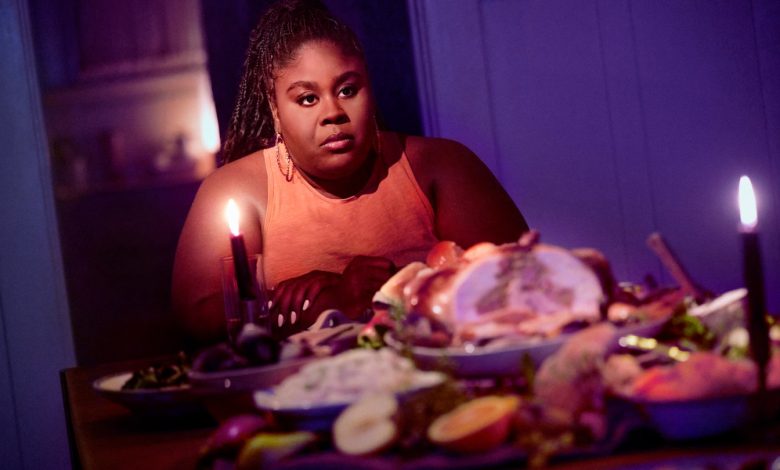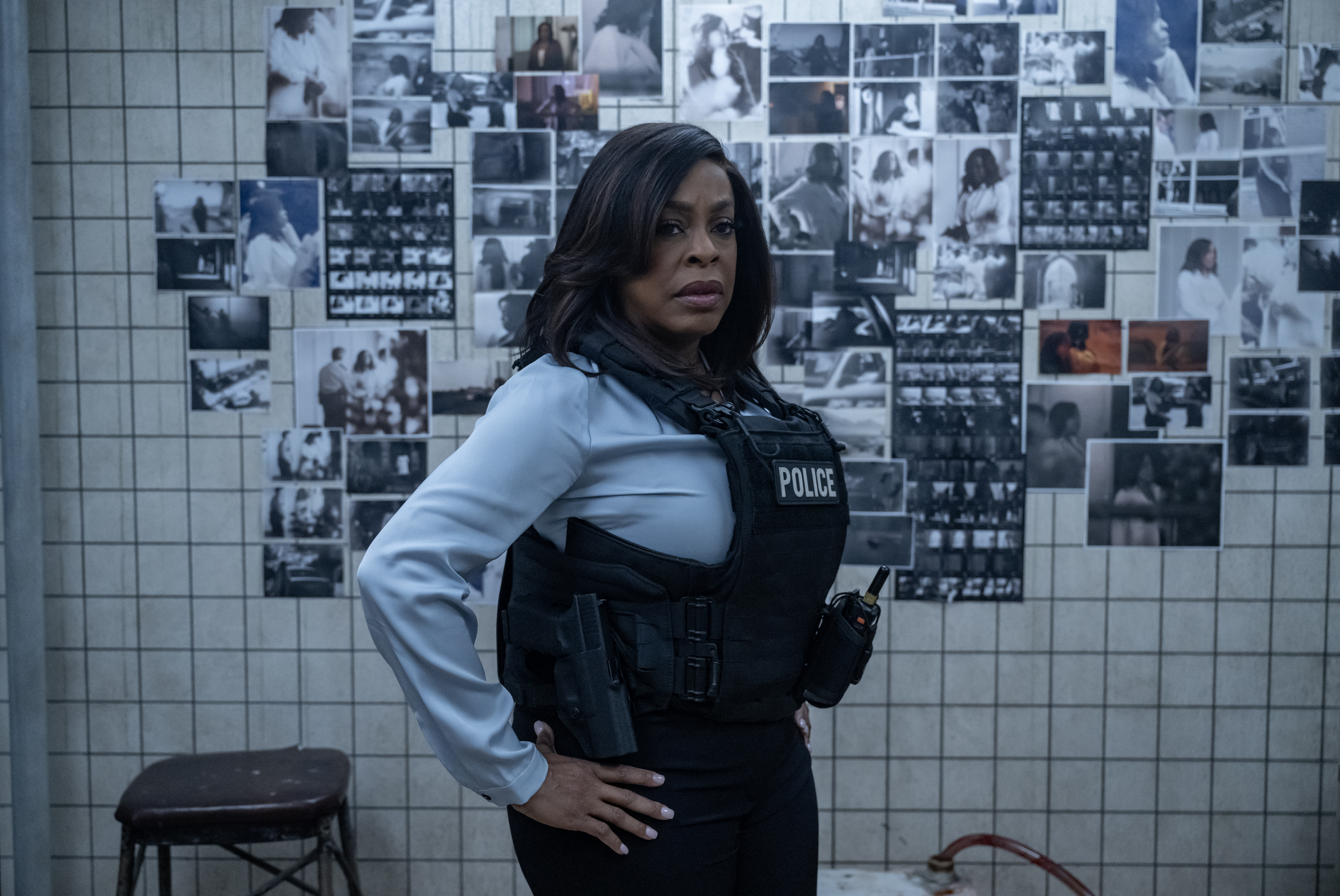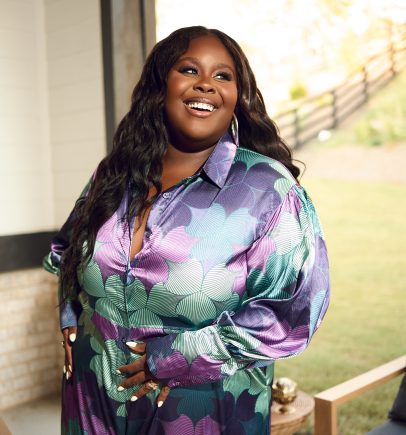There’s Something Viewers Don’t Know About Raven Goodwin’s ‘Grotesquerie’ Character

[This story contains spoilers up to the sixth episode of Grotesquerie.]
When the opportunity to audition for the role of Merritt Tryon in Ryan Murphy’s Grotesquerie first came to Raven Goodwin, she had a few questions
“It didn’t say ‘Grotesquerie.’ It said, ‘Snow Globe,’ and I was kind of confused. Like, is this for American Horror Story? Is this something completely different? But when I finally read the script, I absolutely loved it,” Goodwin tells The Hollywood Reporter of the secrecy surrounding the FX series that’s now midway through its run.
The same goes for the producing team’s reaction to Goodwin’s audition tape, including Niecy Nash-Betts, who stars in the lead role as Lois Tryon, Goodwin’s onscreen mother, and is an executive producer.
“Niecy called me and asked me, was it something that I really wanted to do? And I’m like, ‘duh,’” says Goodwin of the opportunity to work with Murphy and Nash-Betts. Not long after, she flew to Los Angeles to do a chemistry read for the pair “and I was hired right there, that day on the spot,” she notes.
Goodwin’s character Merritt is the daughter of Lois and Marshall Tryon (Courtney B. Vance) whose vice within her dysfunctional family unit is food. In fact, her goal, much to her parent’s chagrin, is to eat herself into being cast in the fictitious reality TV show Half-Ton Trauma. But a small interaction with Ed Laclan (Travis Kelce) near the end of episode six of the horror drama suggests the 27-year-old may desire more than food.
“Merritt is way more than what meets the eye,” says Goodwin. “That’s part of the reason why I took it on. She’s so much more than her outer appearance and her inner battle. I can’t wait for people to see that.”
Below, Goodwin chats with THR about working on the horror series while pregnant with her second child, her experience on set with Kelce and Vance, and being kept in the dark about how the show ends.
***
What conversations did you have with Ryan Murphy and the writers about who Merritt is, and who do you interpret her to be?
We had minimal conversations about who Merritt is. I think the reason they hired me was because I had kind of already found her in a sense. Merritt is more than what meets the eye. She’s a very nuanced person. She’s highly intelligent. She isn’t the typical “woe is me” [character] that people would think she is, but she is self-sabotaging. I think she’s a very confident person. She just doesn’t have much self-worth at the moment, and she’s trying to figure out what life is supposed to look like for her. And right now, it’s her being on this reality show acting as if she is the person that everyone sees her to be, when she knows she’s not.
I read that the cast was kept in the dark on the plot and you don’t know how everything comes together. Is that true?
It’s very true. We shot it in different pieces and we kind of shot it spread out due to everyone’s schedules and locations. So we would all read the script probably once or twice and then when you’re in the midst of shooting, you know the gist, you know the plot, but you don’t at the same time. It makes it really fun. Everybody had their theories about who Grotesquerie might be, and it was a really cool meeting of the minds seeing how everybody viewed this project and viewed the world, essentially.
Merritt and Lois (Nash-Betts) have this interesting verbal contract where Lois says, I won’t ask you about your eating if you don’t ask me about my drinking. What do you make of their mother-daughter relationship?
Sometimes as mothers, we do the best we can, and I think we tend to lean on our kids for emotional support. I think when Lois and Marshall’s marriage started failing — this is my theory — I think Lois created this co-dependency with drinking and with Merritt, and she’s now able to look at Merritt as the issue when the issue is within herself. And Merritt has her own issues, and she can’t really separate the two. I think Marshall and Lois are dealing with a great deal of guilt in terms of Merritt, because they do know her potential and what she’s capable of, and I think the demise of their marriage and the way that they operated in the household is foundational to whatever Merritt is going through.

It just occurred to me that Merritt never visits Marshall in the hospital. How would you characterize her relationship with her father and what was it like starring opposite Courtney B. Vance in that role?
First of all, Courtney B. Vance is absolutely a revelation in this. He’s a beautiful, beautiful actor so being able to star opposite Courtney B. Vance is truly a privilege. Merritt and Marshall, I think they actually have a really beautiful relationship. They connect over things that didn’t even make it to the script. Apparently, they both love butterflies and are both very scientific humans. Yes, he’s a professor of philosophy, but I think they connect over being scholars and seeing the world a little bit different. I think that’s their bond. There’s an episode where Niecy’s [character says], “you know, I taught you how to do puzzles,” and I think that’s her way of saying, “you didn’t just get your smarts from your dad, you got it from me too.” But Merritt and Marshall’s connection is their intellect. And Lois is obviously a highly intellectual person, she has to be to do what she does, but she’s just different. Merritt and Marshall connect on that level more than she and Marshall did, and I don’t think she liked it very much. These are just my theories that I’ve come up with in my head (laughs). Me and Ryan have not had these conversations, but this is what I took out of the context to get my job done.
In episode six, you’re only in that particular episode for a snippet, but it’s such a telling scene with Ed Laclan.
Mm-hmm.
Anything you can say about that moment or what it might foreshadow?
We were folding clothes, honey. I don’t know what to tell you (laughs). I think the viewers are truly in for a treat with the next block of episodes. Seven and eight are truly, truly special — so are nine and 10, and all the rest — but for me, these episodes really pushed me. I’m so excited to have collaborated with Elegance [Bratton] and Alexis Woodall and Max Winkler on these episodes. Everybody is about to gag. The gag is in order, honey.
Now that we have an inkling that you and Travis Kelce’s characters develop some form of a connection, what would you say about the experience working with him?
Travis, he was just so, I’m not gonna say surprisingly [good], because I knew if Ryan was hiring him that there was something special about this project and bringing Travis on. I love when people are curious about the world of acting, and I welcome everyone with open arms. It’s such a niche, different space to be in. It’s such a different career and a lot of people come in and they’re like, “oh, I didn’t know the hours were about to hit like this. I didn’t know it’s a bunch of hurry up and wait and a bunch of sitting around.” Someone said, “actors don’t get paid to act, we get paid to wait and to be patient and to wait our turn to get in front of the camera and say something and imitate life,” and Travis was so cool. He was so patient. He understood how much work it took, and I think he truly respected it, and I think that’s why everybody’s really enjoying him, because he really took it seriously. He showed up to work. He knew his lines and he had fun. I’ve been doing this since I was a baby so when I see people like Travis who are stepping on set for the first time, it’s refreshing. It makes you find a new way of doing the art within yourself.
In another interview you talked about praying for a peaceful work environment before coming onto this project. What was the experience like for you on set?

Peaceful. When you get a script like this and you come from a background of Christianity, you want to make sure things are being done right. That things aren’t being mocked, and it’s done in a beautiful way, and people still get a certain message. When I got this, I said, “Well, God, like I’ve been saying, if it’s not the right environment,” — I was with child during filming — “if it’s not good for me and my baby, I don’t even want it. I’m good. Please don’t even give it to me. But if it’s mine, it’s going to be mine. It’s going to be beautiful. It’s going to be peaceful. And I’m going to work with amazing people.” And that’s exactly what happened. Ryan, he really brought together the most amazing professionals I’ve seen in in the 20-something years I’ve been doing this. I’m talking everybody: art, sound, cinematographers. It was so beautiful to see these people showing up to work every day on their A-game. I watched everybody do their job and I was just like, “Damn, when my production company comes along, I know exactly what to do. I know exactly where to look.” It was like college.
Where there any challenges being pregnant while working on the show?
No, whether you’re sitting at the house or at work, you’re going to be pregnant (laughs). So, I might as well push myself. I felt healthy. My doctors were telling me that I’m healthy and that I’m good. So I made sure that I prayed every day and asked that we were covered and protected, but doing the job was no different. And Merritt, she lives a sedentary lifestyle. So, it was pretty low impact, which is another reason why I took the job. This girl is trying to gain 100-something pounds so she’s going to be sitting down, she’s going to be walking slow, she’s going to be taking it easy, because those are her body’s limits. So I was like, “Cool, I’d be crazy not to enter the Ryan Murphy universe right now. I’d be crazy not to work with Niecy.” She just instantly felt like family.
In the vein of making sure things weren’t mocked, when it came to the representation of a plus-size woman, did you have any reservations? Were there conversations you had about how this character was presented?
Of course, I have a husband who has a career. I have little girls who look up to me. I have a daughter and cousins and nieces. I always consider all of that before I take on anything. But what Merritt is going through is a real thing. Food addiction is a real thing. The hardest part about having a food addiction and about being obese is that eating is something that is second nature. It’s something that we have to do to survive. And unfortunately, when you have a food addiction like that, every little thing you do is calculated. If you eat a banana, the mindset is, “oh, I ate a banana, I’m gonna lose weight tomorrow.” And it’s like, “No, you just ate a banana. You just had some fruit.” It’s really a tough thing to battle with. So to depict that in Grotesquerie, it made sense to me. But like I said, Merritt is way more than what meets the eye. That’s part of the reason why I took it on. She’s so much more than her outer appearance and her inner battle, and I can’t wait for people to see that.
***
Grotesquerie will continue to air two episodes weekly on FX until episodes nine and 10, which will premiere Oct. 23 and 30, respectively, streaming next day on Hulu.
Source: Hollywoodreporter
Related Posts
- Roundball Rocked: With NBA Return Looming, NBC Purges Scripted Roster
- SoundCloud Says It “Has Never Used Artist Content to Train AI Models” After Backlash on Terms of Service Change
- Fox News’ Camryn Kinsey Is “Doing Well” After Fainting on Live TV
- Kerry Washington and Jahleel Kamera in 'Shadow Force.'
Courtesy of Lionsgate
…
- This Alternative Artist Landed a Top-20 Chart Debut With an Album Made Almost Entirely on His Phone





